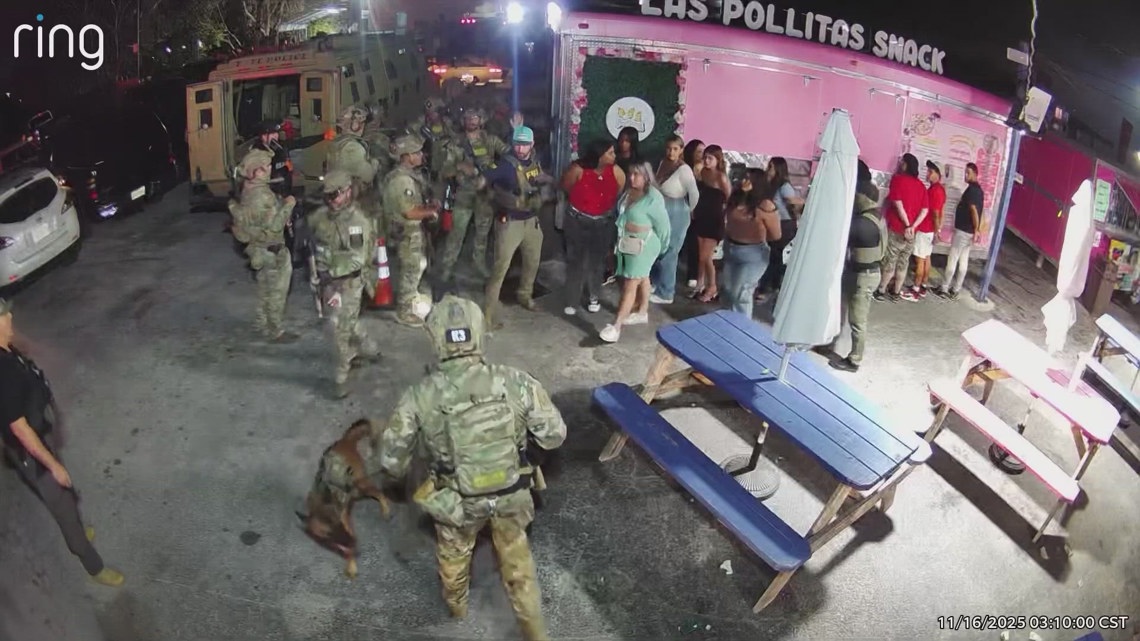
The Nov. 16 raid in the area of San Pedro and Basse was the result of an investigation into a drug dealer, according to records.
SAN ANTONIO — Federal officials now say at least 51 people detained as part of massive early morning raid in north San Antonio earlier this month were found to be Tren de Aragua members, up from the 27 members authorities reported last week.
But questions remain about 92 others who were taken into custody that morning at a location that state personnel had been surveilling for possible illegal activity, an investigation centered on one suspected drug dealer, according to records. Most of the 143 arrested on Nov. 16 in the area of San Pedro and Basse were Venezuelans, the FBI says; others were from Honduras, Mexico, Cuba, Ecuador, Nicaragua, Peru, Guatemala and El Salvador.
According to the FBI, just 25 of those 143 “had a record of criminal history” in the U.S. Some local leaders, including Mayor Gina Ortiz Jones and Congressman Joaquin Castro, have issued calls for transparency and answers regarding the conditions and whereabouts of the others detained, as well as what they’re accused of.
And most arrested that day haven’t been identified yet.
Video captured at a nearby food truck business captured the large law enforcement presence rolling up to the area and detaining dozens of people. Later, an agent is seen using a table umbrella to break the security camera.
Authorities last week said the raid, which involved San Antonio police, the Texas Department of Public Safety (DPS), U.S. Immigration and Customs Enforcement (ICE) and several other law enforcement agencies, was part of a new federal initiative aimed at disrupting transnational criminal organizations operating in South Texas.
But an affidavit and search warrant obtained by KENS 5 reveal it was DPS, a state agency, that was investigating a suspected Tren de Aragua member believed to have been selling drugs out of a mixed-use commercial property at 5959 San Pedro. DPS obtained a search warrant that was signed off by a district court judge around 12:30 a.m. on Nov. 16, just a couple hours before the raid began.
Authorities said after the raid that drugs, three guns and about $35,000 in cash were seized during the raid.
Castro on Tuesday renewed his call for more information, saying neither he nor fellow Congressman Greg Casar have received answers in the days since the operation. Castro previously questioned the lack of information and the circumstances by which authorities ended up detaining nearly 150 people in a raid authorized as a search for one person.
“It’s un-American to round people up and claim they have ties to a gang without evidence or proof,” Castro said in a statement Tuesday. “Especially as 92 people got caught in the crosshairs and were charged with nothing—including two teenage boys who were grabbing something to eat—just to meet quotas.”
Mayor Gina Ortiz Jones said in a statement Friday that her office was “continuing to seek answers regarding the raid… and specifically the status of individuals detained.”
“In addition, our office sent a letter to the head of the recently established regional Homeland Security Task Force requesting an update on activities to ensure we are meeting our mutual goals of maintaining both public safety and public trust,” Jones went on to say. “I look forward to receiving the answers our community rightly deserves. Transparency is the foundation of a safe community, and we must ensure that everyone receives due process.”
About Tren de Aragua
Tren de Aragua, which traces its roots to a Venezuelan prison, is not known for having a big role in global drug trafficking but for its involvement in contract killings, extortion and human smuggling.
In February, the U.S. Department of State designed Tren de Aragua – or “TdA” – as a foreign terrorist organization and group of “specially designated global terrorists.”
Last year, the Department of the Treasury sanctioned TdA, saying it was “expanding throughout the Western Hemisphere and engaging in diverse criminal activities, such as human smuggling and trafficking, gender-based violence, money laundering, and illicit drug trafficking.” At around the same time, Texas Gov. Greg Abbott designed TdA a terrorist organization and said the state would be intensifying its efforts to target members.
